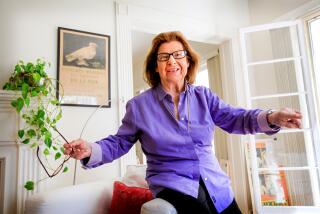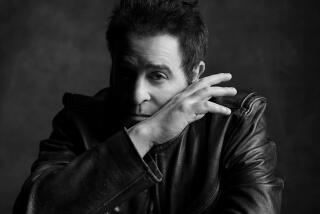Mary Kay Bergman; Voice Actress in ‘South Park’
- Share via
Mary Kay Bergman, 38, a veteran voice-over performer who provided the voices for the mothers of Stan Marsh, Eric Cartman, Kyle Broslovski and Kenny McCormick in the Comedy Central “South Park” television series and the movie “South Park: Bigger, Longer and Uncut.” Bergman’s credits included voices on “Star Wars: Episode I--The Phantom Menace,” “The Iron Giant” and “Mulan.” In recent years, she inherited the role of Daphne in the “Scooby-Doo” videos. Bergman was a student at UCLA from 1978 to 1981 and studied with the Groundlings troupe. In 1994, she taught an animation voice-over course at the Kalmenson and Kalmenson Studios in Burbank. Bergman committed suicide Nov. 11 in Venice.
Beatrice Colen; TV Character Actress
Beatrice Colen, 51, a character actress best known as Marsha, the carhop on roller skates on “Happy Days,” and as Wonder Woman’s sidekick, Etta Candy. The granddaughter of Pulitzer Prize-winning playwright George S. Kaufman, Colen appeared in more than 200 TV shows, commercials and films. A personal favorite of hers was an award-winning Alka Seltzer commercial in which, while wearing a pink feather boa, she sang the “Plop, Plop, Fizz, Fizz” jingle. Her film credits include roles in “High Anxiety” and “American Pop.” On television, she made guest appearances on major shows, including “All in the Family,” “Night Court” and “Knots Landing.” A memorial service is scheduled for 3 p.m. next Sunday at St. James Church, 3903 Wilshire Blvd., Los Angeles. On Thursday at Cedars-Sinai Medical Center of lung cancer.
Paddi Edwards; Voice Performer in Disney Movies
Paddi Edwards, 67, actress known for her voice work in Disney movies, including the evil eels Flotsam and Jetsam in “The Little Mermaid.” Edwards was a veteran actress, born in England, whose quirky, raspy delivery made her a popular talent in the Disney pool of voice actors. She had a recurring role in “Pepper Ann,” a Disney cartoon airing Saturdays on ABC, and gave voice to characters in “Ghostbusters,” the “Hercules” animated series and the 1996 remake of Disney’s classic “101 Dalmatians.” She was best known for voices she provided for the conniving sidekicks of the villainous octopus Ursula in “Little Mermaid,” the 1989 Disney hit movie. A memorial service is scheduled for 10 a.m. Tuesday at Bastian and Perrott Mortuary, 18728 Parthenia St., Northridge. On Oct. 18 of respiratory failure at her home in Encino.
Gene Levitt; TV Writer, Creator of ‘Fantasy Island’
Gene Levitt, 79, veteran television writer, director and producer who created the 1970s hit “Fantasy Island.” A New York native, Levitt worked as a newspaper reporter in Chicago and served in the Marines in World War II as a bomb disposal officer before moving to Los Angeles after the war. He began his Hollywood career as a writer on the radio series “Philip Marlowe.” He went on to write, direct and produce many television features and series, including the movies “Run a Crooked Mile” starring Mary Tyler Moore and “Yellowbird” starring Carroll O’Connor. He created “Fantasy Island,” a romantic drama about a remote island resort where people’s wishes were fulfilled by resort director Ricardo Montalban and his diminutive assistant played by Herve Villechaize. The show, for which Levitt also wrote and directed, was a hit for several seasons beginning in 1978. Among other shows he produced, directed or wrote were “S.W.A.T.,” “Barnaby Jones,” “Project UFO,” “Tenafly,” “Hawaii Five-O” and “Alias Smith and Jones.” A memorial service will be held Dec. 4 at 11 a.m. at the Writers Guild Theater, 135 S. Doheny Drive, Beverly Hills. On Monday in Los Angeles of prostate cancer.
Daniel Margolies; Prosecutor at Nuremberg Trials
Daniel Margolies, 89, a prosecutor at the Nuremberg war crimes trials. A government lawyer and economist throughout his career, Margolies worked in London during World War II as part of the Office of Strategic Services, the forerunner of the Central Intelligence Agency. The OSS chief, “Wild Bill” Donovan, asked Margolies to go to Nuremberg at war’s end as part of the prosecution team. His trial memories were recorded in the 1990 book “Eyewitnesses at Nuremberg” by Hilary Gaskin. Margolies later moved to the German desk at the State Department, where he was attacked as a Communist by Sen. Joseph McCarthy. In 1957, Margolies became first secretary for economics at the U.S. Embassy in London. Three years later he was sent to the embassy in Leopoldville when the Belgian Congo gained independence. From 1965 until he retired in 1970, Margolies served on the President’s Science Advisory Committee in Washington. On Nov. 6 in Aurora, Colo., of pneumonia.
Benjamin Schwartz; Harvard Expert on China Politics
Benjamin Schwartz, 82, Harvard University expert on political thought in China who showed how the communism espoused by Mao Tse-tung differed from Soviet communism. The eminent China scholar was born in Boston and attended Boston Latin, a public high school for high-achieving students. He earned a scholarship to Harvard, where he received his bachelor’s, master’s and doctoral degrees. His college years were interrupted by World War II, when he served in the U.S. Signal Corps as a cryptanalyst assigned to break Japanese codes and later as a censor during the U.S. occupation of Japan. During his service in Japan, he became fascinated with what he called “the mysterious Orient” and returned to Harvard to earn his doctorate in East Asia studies. A protege of John K. Fairbank, another Harvard scholar who pioneered the field of Chinese studies in the United States, Schwartz joined the Harvard faculty in 1950 and remained there until his retirement in 1987. The author of several books, he is best known for his work tracing the historical roots of Chinese communism, in which he showed that Mao had developed his own brand of communism distinct from the Soviet model. In his 1951 book “Chinese Communism and the Rise of Mao,” he showed how the triumph of Mao’s ideology relied on defiance of Soviet plans and orders. In particular, he showed how the success of the Chinese revolution hinged on the young Mao’s decision to incite China’s impoverished peasants rather than urban workers, who were the revolutionary force in the Soviet model of communism. On Sunday at his home in Cambridge, Mass.
More to Read
The biggest entertainment stories
Get our big stories about Hollywood, film, television, music, arts, culture and more right in your inbox as soon as they publish.
You may occasionally receive promotional content from the Los Angeles Times.










